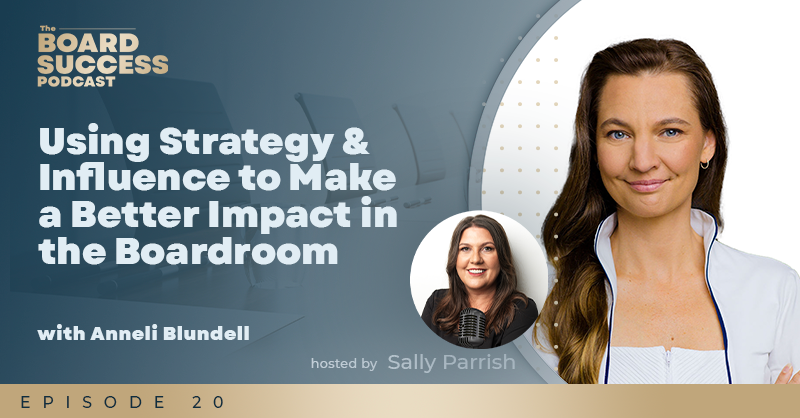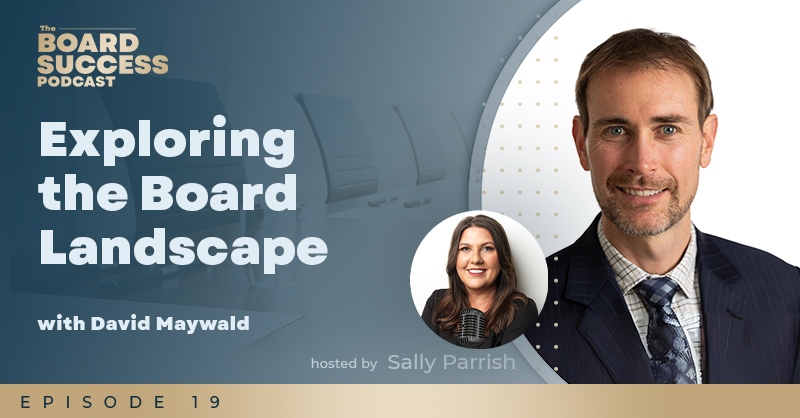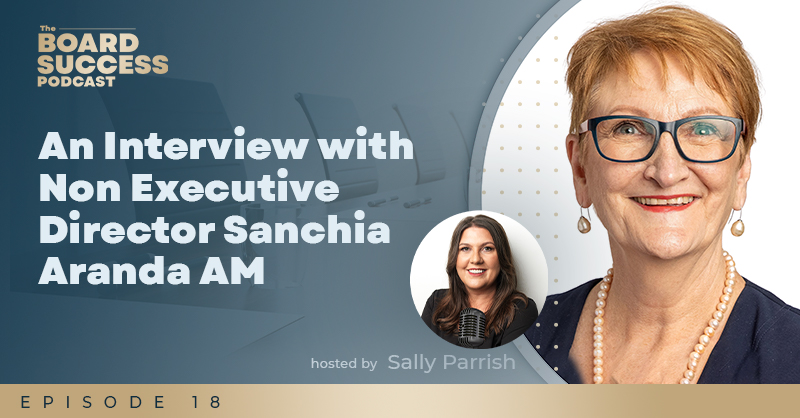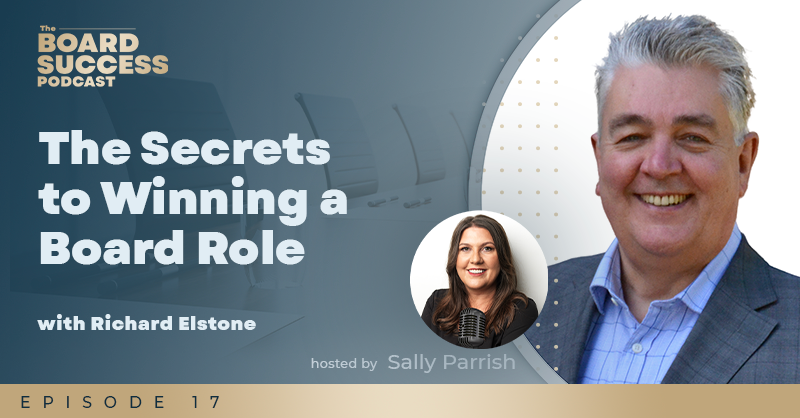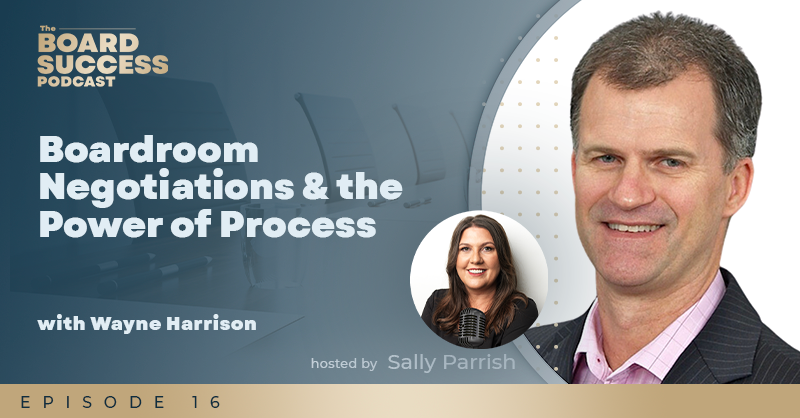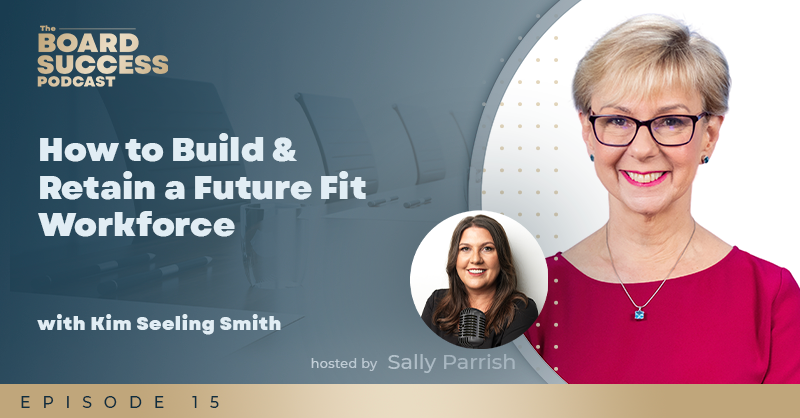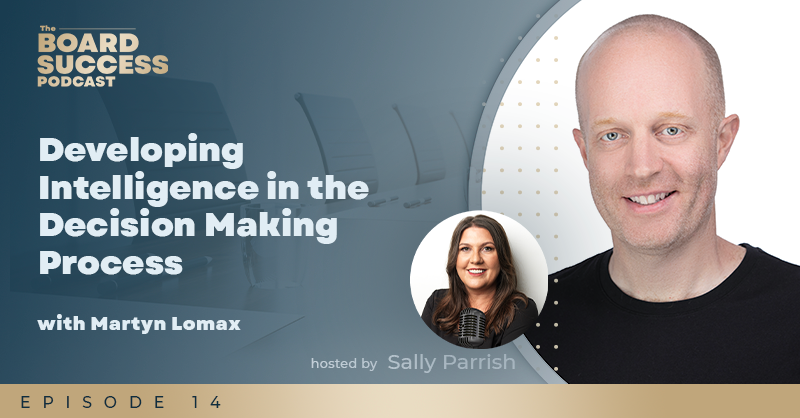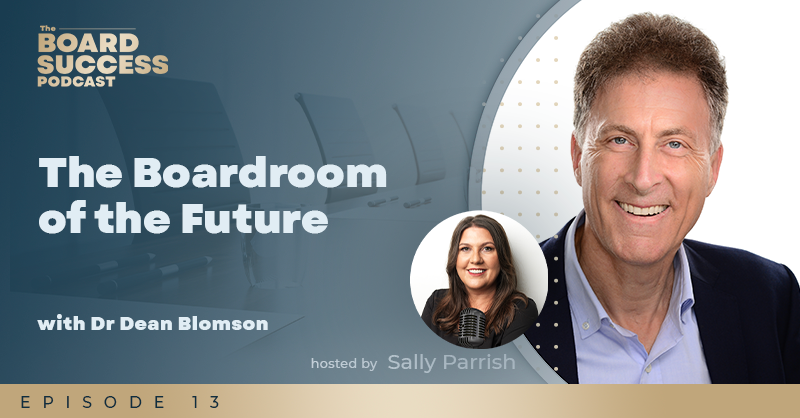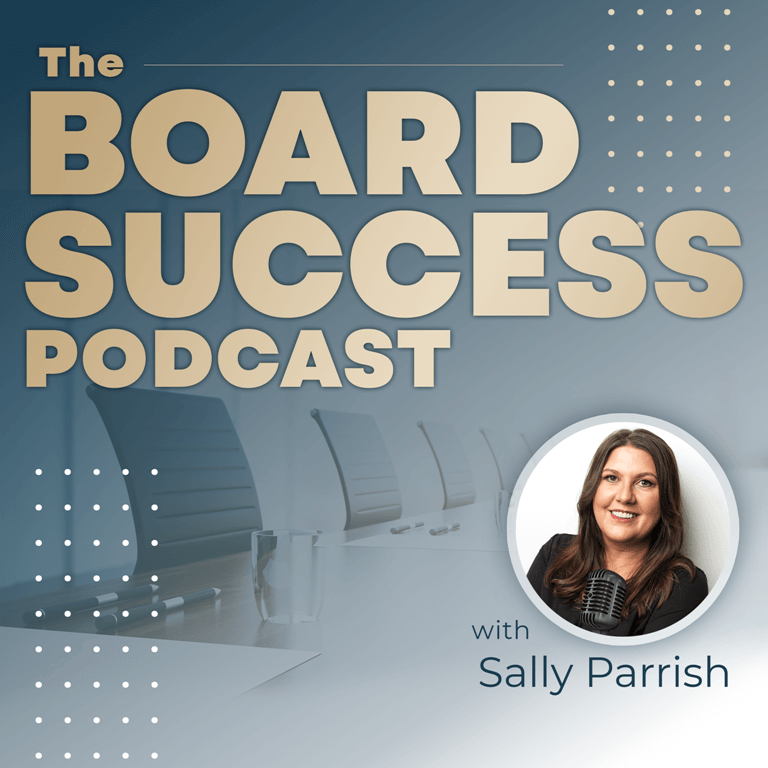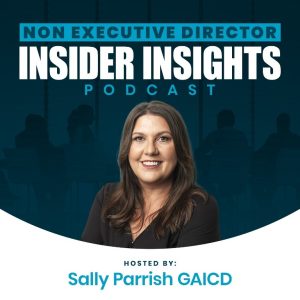Master your Health to Win!
Sally Parrish interviews Shaun Tucker
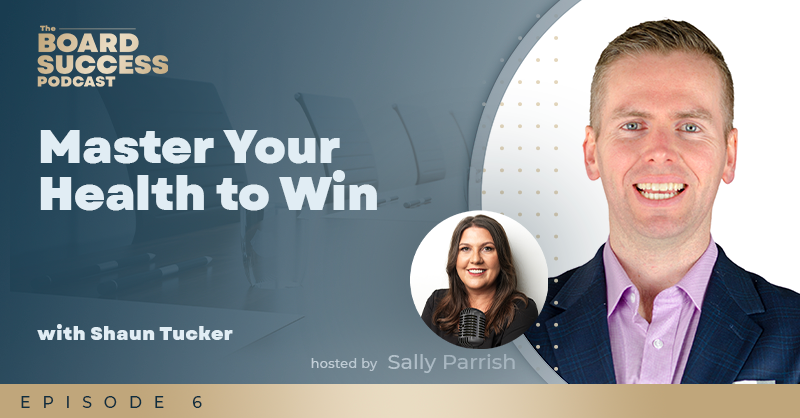
Shaun Tucker of 'Healthy CEOs'; a company dedicated to helping business owners and their employees to be in their best shape - physically, mentally, and professionally, joins us in the episode to discuss the challenges to mastering our health. Shaun is a physical performance practitioner who has worked with high level athletes, CEOs, directors, executives, and small business owners. Shaun blends ancient wisdom and technologies with modern science to combine mindset, exercise, nutrition and lifestyle to bring an all-encompassing result driven approach to help his clients perform in the top 1%.
In this episode we discuss how to be healthy in busy executive roles and how legislation is making businesses more and more responsible for the health and wellbeing of their employees.
FURTHER INFORMATION
Meet Shaun on Linkedin https://www.linkedin.com/in/healthyceos-shaun/
Click Here to View the Podcast Interview Transcript with Shaun Tucker
Sally Parrish (01:28):
So in this episode, we're joined by Shaun Tucker, from Healthy CEOs who has an interesting title, a physical performance practitioner. And today we're talking about mastering your health to win. Shaun works with high level athletes, CEOs, directors, executives and business owners, and shows them how to perform in the top 1%. And it's doing some really important work in corporations right now around the mental wellbeing legislation. So let's dive straight in. Welcome, Shaun. Thanks very much for joining us today.
Shaun Tucker (02:00):
So it's such a pleasure to be here. And yeah, well, there's there's so much to unpack straightaway.
Sally Parrish (02:08):
Well, let's start by asking what is a physical performance practitioner?
Shaun Tucker (02:12):
It's a great question. I think within this space, I consider myself ..it is coaching. But the idea of being a practitioner, and I suppose the physical performance practitioner is really giving frameworks of how this person can construct themselves to be the ultimate sort of version of themselves. So it's not a reliance on, I need a coach, I need a coach to hold my hand for the rest of my life. Once you understand the frameworks of how you are built, and how you can master yourself, that's really the key to creating the life that you really want.
Sally Parrish (02:49):
I love that so empowering in executives so that they can be the best version of themselves rather than coaching them along the way. There's, like you said a lot to unpack here. And we're focusing on wellness today. And wellness, for me is one of the big three that I think boards should be working on right now the other two being ESG & technology. I think when it comes to board work, we've got performance and compliance. And whilst that governance side is really, really important, I think we need to do a lot more in the wellness, ESG and tech space, if we're going to be innovative leading businesses that you know, set the world on fire make us one to watch. So let's talk about firstly, how you work with individuals. And then we can talk about the work that you do within organizations. So within your framework, you're talking about looking at three key areas within our lifestyle. So we've got the mindset, we've got the nutrition, and we've got the movement, and I'm glad that you call it movement and not exercise because that's the word that sends me running for the hills personally, I can walk all day long, but don't ask me to exercise, let's talk about those things. Because COVID obviously had an impact on lifestyle. And you know, for some people that was for good. And for others, like myself not so good. There's a few of us walking around with a few extra kilos, and maybe not quite as active as we were I know, a lot of mums in the playground aren't putting their kids through so many activities. Now, you know, before COVID, they had three or four activities on the go. And now we've kind of pared that back a bit. And the kids are doing less activities, we tend to do less running around now so talk to me about nutrition and movement for someone that really needs to make a big improvement in that area. What would your top tips be,
Shaun Tucker (04:52):
I think understanding your physiology. So from a very scientific perspective, what is the minimum effective dose for your body to get what it needs from its food and from its activity, so movement to actually get into a place where you're physically performing better, you're mentally performing so much better than you were before. And life just sort of happens in the way that you kind of almost like go into it. You don't have to stress about our but this guy up the streets doing this much and I'm only doing this much. It's not comparing yourself to anyone else, but it's just understanding you at a deeper level. From that physiological scientific perspective. I think that's really key. And that's sort of a missing link especially in this space of health and wellness.
Because when you start to understand that everybody's body is a little bit different, there's certain aspects like certain people, intermittent fasting, for example, works really great for others, not so much. For certain people, a little bit of movement, like walking and that kind of thing is perfect for them. But other people need to go on more intense bouts of exercise because that's how they actually get their energy. So it's just deciphering which is which is right for them.
Sally Parrish (06:18):
And I love that that really explains why you know I have friends that get results and and I just can't get the same results trying to do what they do so finding your own thing, I think when we talk about goals, you'll often find that people do have some form of health goal, whether that's weight, whether that's fitness, whatever it is for them. But my take on it is that health is not the goal - health, it's a vehicle, right? You can have all the goals in the world. But if your body isn't healthy, you're never going to be able to achieve those goals. So I like how you talked about physiology there, because for me, that kind of brings it back to purpose, you know, we need to have healthy bodies for the purpose of what we're trying to achieve. And when you bring that back to physiology, that to me makes it more overarching than just worrying about what I'm going to have for dinner this evening. Or if I'm going to get to the gym. Next week. I love how you do that. We're not well informed on the things that we put into our body, the foods, the drinks, the things that we're eating and drinking every day. There's a lot of misinformation, there's a lot of bad information. How do you start to navigate that minefield?
Shaun Tucker (07:33):
This is this is an interesting question. Because we've come so far, in terms of, we have the information. So with tech, right? If the technology available today, we have the information at our palms, right, it's ready, we can search up on whatever engine you want, and just find whatever piece of information or misinformation that you can find possibly anywhere. And this is where it becomes even more complex, because you've got people that are thinking that they need to do this, which works for some people, but not all, because once again, it comes back to the individual's biochemistry, but also like the size of their body, it's really difficult to understand where to start. So we actually use a third party platform here. And they're called pH. A. So Precision Health Alliance is the name of the company. And they're formerly known as pH 360. And these guys look at you know, ancient sort of medicine, and body type. So I have Vedic doshas, where it looks at, you know, mesomorph, ectomorph endomorph, which most people have heard of, but don't really truly understand. It's actually the different sort of body types. And this is looking at the length and the circumference of different limbs of the body. And these guys have really just taken this to a new level, and looked at the three different body types and gone into well, now there's six, and each person has a number that correlates to their body type. So when you look at this, it actually comes back to not so much the food you're consuming. But what's more important is actually the time of the day that you're actually eating, you're exercising. And the time of the day when when you're eating is actually more important than what you're sort of putting into your body. So when you look at the foundation aspects of okay, my body is it's a crusader or it's primarily ectomorphic, which means that it needs to get quite a lot of carbohydrates in to have the energy for the brain to kind of operate at the level that it needs to operate. And because the brain prefers glucose as a primary fuel source, the quickest way to get that in is through carbohydrates. And so they need carbohydrates all the time throughout the day. So breakfast, lunch, dinner, also snacks as well. But for someone that had generally some other body types, they're known as endomorphs, which are generally bigger, their frames are a little bit bigger, this actually comes back to the length of their gutt. So they'll link, the length of the cut is a little bit longer, meaning that the food they eat has more time to sit in there and actually be digested properly. So they do a lot better. Having longer rest periods between their meals. Snacking is not such a great thing for these, this body type either, but it really comes back to Okay, where do you start? This is where I start understanding what body type they are using the software. And there is a there is a free test that you can do and it's about 80% accurate on their website. And it just gets you in the ballpark of where you need to start swinging. If it was a baseball thing, right, yeah, so there's different ballparks? Yeah, once you get in the ballpark. Now you can start hitting homeruns
Sally Parrish (11:10):
I love it. And once you feel a bit of success, and that gives you the motivation to keep going. There's a lot of clients that I work with that do marathons and triathlons. So there are a lot of execs that are super super focused on the fitness and the wel being what's the correlation between them that healthy body healthy mind, what's the correlation in terms of getting the outcomes that you want you talk about master your health to win. How does that happen?
Shaun Tucker (11:37):
Well, it's interesting because most, I would say people in that in that area or that role that they're in, especially if they're more keen to do things like triathlons, and, you know, endurance sort of events, that sort of suggests to me that they're probably one body type, more so than the others. Which is interesting, because when you look at that body type, I'm also the same. So we become very, very focused and goal driven. And almost, the emotional intelligence is there. But they're so aware of their own emotions, that this, what's more important, is achieving the goal. Because it's dopamine that is the primary hormone for that body type, which means they can literally just tunnel vision focus on whatever it is that they have, as their goal. So they love, you know, these endurance events where they can, it's almost like a linear game, they're just constantly at this level, where they can just glide along and get to the finish line. And it's not so much about achieving the goal, it's actually more about the pursuit of the goal, that gets these people really fired up.
Sally Parrish (12:48):
That makes a lot of sense, because it doesn't matter what event they complete, they're always looking for the next one. So it's never about the outcome. It's never about arriving at done. These three clients are all the same, they're always pushing and striving that I'm, you know, the three that I'm thinking of right now. So that's a good indication in terms of where the mental wellness comes into this, right, because they've obviously got the physical wellness. But what about a mental well being if you're the type of person that keeps pushing and pushing and pushing, what's the danger, on that side?
Shaun Tucker (13:23):
There is a pretty big danger, because these people in general, they can push themselves. But the the side effect of pushing yourself too much is that you become burned out without even realizing it. And this is an area where we definitely specialize in is actually recovering people from burnout, and burnout prevention. So one of the key aspects of burning out is, what happens is you burn out your mineral reserves inside of your body. So mineral reserves it things like you know, your sodium chloride, your potassium, your magnesium, this is what gets burned out when you burn yourself out. So it actually takes quite a lot of effort to not only get your vegetables and things like that, where you get lots of minerals in but things like salt. So a really good raw salt that you can get into your body that has really, really high quality minerals in it is going to do your body so much better than you know just going to get a sports drink that's full of sugar. So it's kind of almost like a catch 22. Because these sort of people they will love to just pursue and go for the goal. But if they're not looking after their physical body from what they put it in, then their mental body and their mental well being will also suffer, because they can almost just tune out to the rest of the world.
Sally Parrish (14:51):
Yeah. So what I'm starting to appreciate during this chat here is that one end of the spectrum, you've got mental health impacting on our ability to eat well and to move. And at the other end of the scale. You've got our mental wellness being impacted by trying to do much in that space. It's a real balancing act. Isn't it?
Shaun Tucker (15:18):
is. Yes. Yeah. This is where they talk about, you know, balancing the yin and the yang. Yeah. Because if you're not resting well, and what happens when your mental well being is suffering is your sleep goes downhill. Yeah. What's the best way to recover your body physically, and mentally, is sleep like depression itself. It's deep rest, like getting into the state of just being able to rest and rest really well to recover your body. This is the key.
Sally Parrish (15:45):
Yeah, and a lot of high performers can't rest. We don't rest. We keep going. We are overachievers perfectionists, you know, Superman, Superwoman. And we just keep going and that taking time for ourselves almost needs to be excused. You know, I'd sat down to read a book because I've been on my feet for four hours today. And I just felt like we should just be doing these things automatically. They should be part of our week. What I love about your philosophy, Shawn is the very first time we started speaking, I expected you know, almost a kind of Sergeant Major sort of drill mentality. I buy a bed give me 20 Push up, blah, blah, blah, blah, blah. And you actually have a really A gentle but scientific approach to what you do. And some of the advice that you gave me was, you know, just make really small changes if you're not in the space to make a big change then make a little change. And let's look at the compounding results of doing that. So you talked about salt there and one of the things I did do was changed my salt. So change from a Himalayan salt to a Murray River Salt getting more minerals. And I gotta tell you, my 11 year old absolutely loves you, because now she can throw salt all over her dinner. She thinks you're the bee's knees now. I mean, that's part of the misinformation, right? So it's bad for you don't eat too much salt, actually, there's a salt that's good for you. And in moderation, you know, that can be absolutely very beneficial. So that we've looked at the individual, and I think there's probably not a person listening to this episode that knows that they need to eat well, and they need to move. But thank you for some guidance, there into understanding different types of bodies and the different types of movement that we might need. And, you know, hopefully, that is some food for thought to go and check out that resource, the PHA, find out what body type we have, and what our specific body needs. And we'll respond best to let's absolutely talk about wellness at the corporate level, because this is what frightens me, you know, an individual, you know, they can monitor themselves and know how well or not they're doing on a wellness scale. But as a corporation, how do we manage all the people within that organisation and ensure that they're doing well? And there's some really great legislation that's come into force now, but it does put the onus squarely on the corporation, doesn't it?
Shaun Tucker (18:19):
Absolutely. And it's quite, I don't know, it's quite actually terrifying for many, many regards, because the legislation that passed September last year, handed over the responsibility of the mental health for the employees, to the organisation, or to the company. And so if there's any sort of employee that has any mental health issues, and work is a contributing factor, to the outcome of this employee, what can happen is if there's no mental health policy, and there's no proactive action, in terms of managing or helping the employee, from that perspective, there could be literally a jail sentence or a fine of substantial amount, you know, you're guilty until proven, so you're innocent till proven guilty, right? So if the lawyer comes against you and says, Look, you didn't do anything, you didn't even have a policy in place, that is a huge responsibility placed on the employer now. So understanding your employees is one thing, but actually having the tools and the resources available for your employees there ready at the get go. And having professionals and people in the, the space of being, you know, an expert in this area, come into your organisation. And actually, reassure is one thing, help create awareness is another thing for your employees and just help them feel supported. Because, let's say the last three years, especially with you know, with COVID happening and that kind of thing. change happened very quickly, very, very quickly, especially in in Melbourne. Like we went through six lockdowns, and it all happened within, you know, announcement that closed down the whole city within less than 24 hours. Change doesn't normally happen that quickly. So what are the what are the flow effects of this for the general population? If someone's struggling, and you don't know, you simply don't know. It's creating that environment where people can feel vulnerable. And a lot of the times I find that the employee or people in general don't feel .., they're not able to get into that state of vulnerability. Because they don't have that almost. It's not that they don't trust the people that they're around. It's that they almost have a fear of being vulnerable, whether they might be judged, whether they might, you know, be put in a position that kind of not demotes them in, in that sort of sense. But I think it's that fear of being judged is what it really comes down to. So if you're an employer of an organisation, having a third party come in, where they're completely detached from knowing really the organisation to the level that you know it and knowing the people. I think it just creates that almost like safe space for people just to come become a bit more vulnerable.
Sally Parrish (21:25):
Yeah, and I love that and I love the work that you're doing. And with organisations to provide that third party service that, you know, not just ticks, the boxes for mental wellness, but actually provides tools and strategies for the organisation so that all of their employees can enjoy wel being. And I think that's important for a few reasons. You know, firstly, you know, as a coach, I'm advocate for wellbeing. And I've worked in organisations that have had mental health issues and patterns, even there are different industries that have higher patterns of poor mental health than others. So as a coach that's worked in that space, I, you know, fully embrace this work. But you know, just on that human being level, we need to be better at looking after each other and spotting the signs and helping, supporting and you said, awareness, but it's having those strategies as well, once you are aware, sure, as a professional, I'd be talking to my clients, people on boards about defensible positions. So, you know, like you say, if this goes wrong, and sometimes it does, that's the nature of their mental wellness beast it does sometimes go wrong. But if it goes wrong, you want to be in a position of knowing that you've done everything you possibly could have, you know that you took every step that you took the advice, you took the guidance, you wrote the policies, you made sure the policies were effective in the organisation, you monitored them, you throw enough resources at them, for them to work and as truly what a defensible position is, it's not you know, what went wrong. But it's how did this go wrong? So if you work on a board and you want to sleep at night, I would really look at just looking at what would be your defensible position around the current mental wel being practices that you have in place in your organisation? Yeah, absolutely. But bigger than that, Shawn, right, take the legislation away and take away, you know, the need for this and why we should be doing it. But the opportunities that come with a organisation that do have, you know, high regard for wellbeing what do you know about those types of organizations? What are the results that they see,
Shaun Tucker (23:50):
The opportunity lies within, once you can have someone basically flourishing in the environment, right, it's like planting a seed in a very fertile soil versus something that's like sand. The difference between sand and soil is actually the organic matter that exists in the soil. Sand has everything that it needs to be soil, it's just missing one key component. And I feel like that's a huge disconnect. But it also opportunity within the organizations that are ready to kind of allow their employees to flourish, right? Because if you go and plant that seed, and you just put it in the fertile soil, well, whatever you've just planted can turn into, like, whatever you want it to be, right. So if you planted an apple tree, well, it's going to turn into a beautiful big apple tree, given that you water it, and allow it to continue to flourish. Whereas if you just go and put it in the sand, what's gonna happen?
Sally Parrish (24:50):
Yeah, love it. I love it. And that word flourish. I mean, that really sums it up for me, if I have an organisation, and I've got employees that are flourishing, They're engaged. They're bringing me opportunities for growth. They're telling me where things can go wrong with a positive mindset of fixing those. They're part of the success plan, you know, they're part of wanting to win. They're loving their environment. I want flourishing employees in my organisation. Yeah. So it's a beautiful word. I love that you've said that, Shaun, thank you for sharing just some of those insights, I know that we've only scratched the surface, I wanted to talk about my coffee addiction and how, how you reliably informed me that I'm actually drinking mold, so maybe people should check you out and find out a bit more about that. But that certainly helped me with my coffee addiction to know that I was enjoying mold. Small steps really do make the difference, but having the information around the right steps to take and that information being relevant to you and your body type and how you're built and how you function. I think that's really, really vital information. So if you're listening today, whether you're an executive just looking for improvement for yourself, or whether you're an executive looking to bring about positive change in your organisation around the areas of wellbeing, check out Sean Tucker and the incredible work that he does over at Healthy CEOs. Shawn thanks very much for joining us today
Shaun Tucker (26:30):
Thank you so much Sally it's been an absolute pleasure thank you
Sally Parrish Outro (26:35):
Thanks very much for tuning in. I'd love to know what you thought of this episode and what you took away from it. I'd also love to know what topics you're interested in hearing about in the future, and which experts you think should be featured on this Board Success Podcast. If you enjoyed listening, please share with your colleagues who might also have an interest and make sure you click to follow us subscribe to be advised about upcoming episodes. In the meantime, if you're a leader or a successful executive, and you're looking to launch your board career, or if you're an established non-executive director and you're ready for the next level, check out the resources we have available for you on the website at boardcoachinginstitute.com.au. Until next time, here's to your boards success.
Explore more episodes
